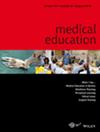Landscapes of psychological trauma in residency education: Exploring lived experiences
Abstract
Introduction
Resident physicians may experience psychological trauma both at work and in their personal lives. Injury from trauma can impact learning, patient care, relationships, mental health and well-being. Residents' experiences of traumatic injury have not been well-described in the literature. The purpose of this study was to explore residents' lived experiences of psychological traumatic injury.
Methods
The research employed a hermeneutic phenomenological methodology. All residents at a single Canadian medical school and support professionals who work with them were invited to participate in semi-structured interviews. Anonymized transcripts were analysed in duplicate and findings interpreted through discussion amongst the research team.
Results
Thirteen residents and three support professionals participated. Four core domains of lived experience within participant narratives were identified, each with multiple dimensions: impacts of traumatic injury (multifaceted, internal reactions, layered judgements), adaptations to traumatic injury (shifts in mindset and behaviour), traumatic injury over time (acknowledging, oscillation, meaning-making) and modifiers of traumatic injury (previous life experiences, internal resources, contextual circumstances). Three metanarratives intersecting these dimensions of experience were complexity, sociocultural influences and existential tensions.
Conclusion
In summary, residents' experiences of trauma and the associated traumatic injury are complex, highly individual and difficult to anticipate or resolve with linear support models. This research will help guide ways to better support residents while addressing problematic aspects of medical education that may contribute to experiences of trauma.




 求助内容:
求助内容: 应助结果提醒方式:
应助结果提醒方式:


